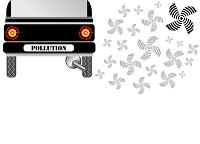
If you park your vehicle inside your garage, and use garage space to store items like cleaning chemicals and pesticides, unfortunately, dangerous fumes and contaminants are likely to be leaking into your living space -- if you have an attached garage.
The good news is that there are simple and affordable approaches to keeping air from your garage out of your home: containment, prevention, and ventilation and detection.
Sealing your garage
Shared walls and ceiling areas between the home and garage should be properly sealed. If you are undertaking new construction, make a clear point to the contractor that proper sealing is imperative
If you need to seal your current garage space, this can be accomplished by sealing unfinished walls. First, install drywall if there is none. Then, seal drywall joints along the seams, floor and ceiling with compound and paint.
The access door should be sealed with weatherstripping. Seal wall outlets and light switches by installing gaskets behind them.
Preventing and minimizing contaminants
In controlled air-quality testing, homes where vehicles were parked in the garage contained high levels of carbon monoxide (CO) and benzine. Homes without attached garages, however, had little or no traces of CO and benzine in the living space. Parked vehicles with hot engines continue to emit CO and other fumes for several hours. If you must park your vehicle inside your garage, first park it outside to cool off. Avoid idling the car inside the space.
Ventilation and detection
Garage ventilation is key for expelling contaminated garage air to the outside air, and to neutralize air pressure differences between the garage and living space. Differences in air pressure, particularly during cold Norfolk MA winters, can force air movement from the garage to the home. Continuous ventilation is ideal. Install a ventilating fan run on a timer to exhaust fumes. Ensure prevention of CO hazards by installing CO detectors.
If you are concerned about air from your garage seeping into your home, call the professionals at Rodenhiser Plumbing, Heating & Air Conditioning today. We serve homeowners in the Route 495/128 area of Norfolk MA.
Our goal is to help educate our customers about energy and home comfort issues (specific to HVAC systems). For more information about other HVAC topics, download our free Home Comfort Solutions Guide.
Image via Shutterstock.com